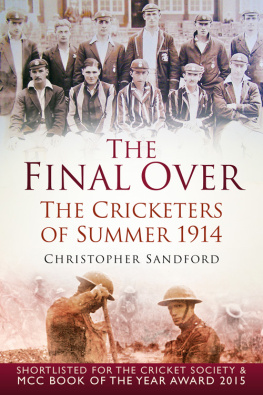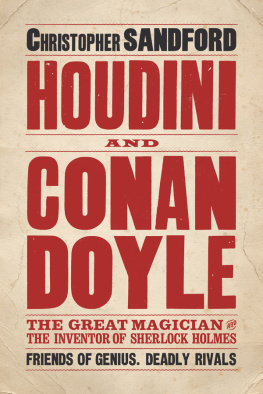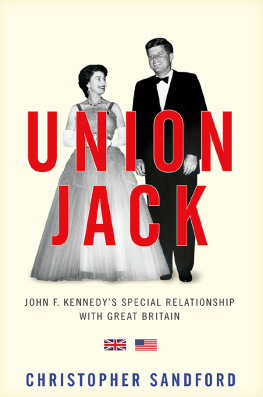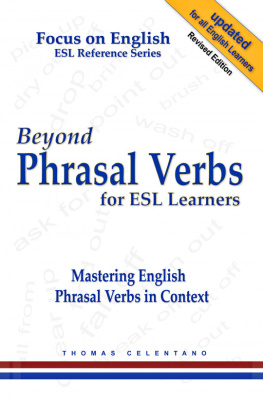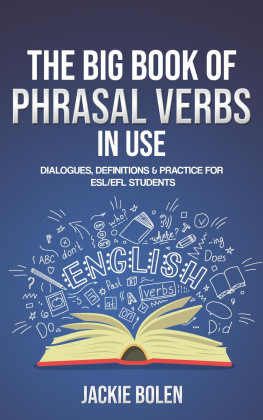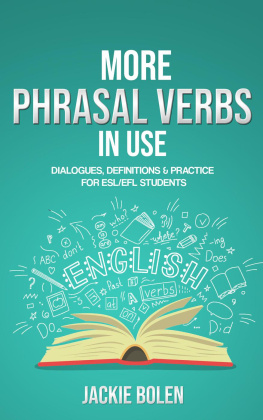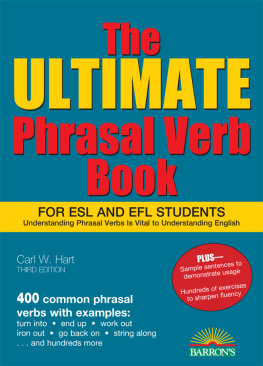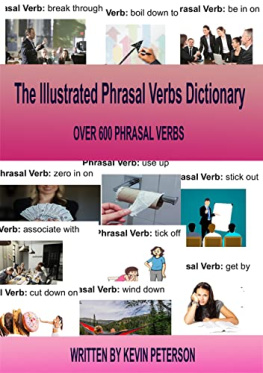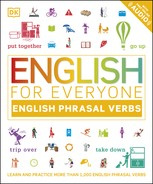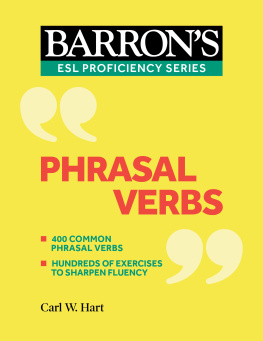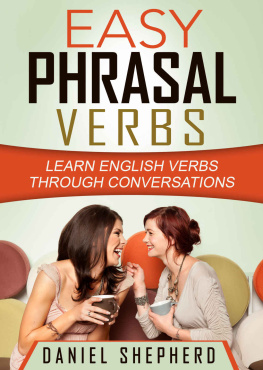Amazingly Easy Phrasal Verbs!
by
George Sandford
Amazingly Easy Phrasal Verbs! 2012 George Sandford
All rights reserved. No part of this book may be reproduced or transmitted in any form or by any means, electronic or mechanical, including photocopying, recording, or any information storage and retrieval system, without prior written permission of the Author.
ISBN-13: 978-83-932831-8-7
Remember, you don't need to own a Kindle ebook reader to read ebooks. You can download the free Kindle app. for PC, laptop, tablet or smartphone.
Free Kindle apps
For those of you who like to get straight down to business without the bla bla bla, here's a sample chapter for you to see what it looks like and how it works.
Chapter 1 - Alan returns from holiday
Run out of - to have no more of something
This morning, I wanted some toast but Id run out of bread. So, I rushed out of the house and got into the car. I turned the key but the car didnt start - Id run out of petrol! I ran down the road to the shop but theyd run out of sliced bread. I decided to buy some rolls instead. Then I realised Id run out of money. Im always doing it and the shopkeeper has run out of patience with me. I came home, looked at the clock and saw that Id run out of time for breakfast.
You can run out of food, most substances and materials, time, money, patience and luck. What have you ever run out of?
Put off - postpone doing something
Its my own fault - Im always putting things off . I dont like shopping so I put off going to the shops. I hate filling up the car with petrol so I put off going to the petrol station. I hate queuing so I put off going to the bank and now Ive got toothache because Ive been putting off going to the dentist for weeks.
You can put off doing most things - although its not a good habit! What things do you put off?
Get back - to return
Although, I have got an excuse; I only got back last night. Id been away on holiday and the flight got back late and it was even later by the time I got back to the house. I can tell you, I wasnt exactly looking forward to getting back to work.
You get back to a place or activity.
Hold up - delay
The problem is that there was a hold up with my flight coming back. First of all, we were held up at the airport because of a storm and no flights could take off. Then we were held up waiting for other flights to take off. Finally, we were held up at the airport when we got back because the baggage carousel was broken. It was just one hold up after another.
As you can see, hold up also exists as a noun. Apart from the meaning of delay, it can also mean stopped by a robber. Joke: a man goes to town and comes back two hours later. When he returns his wife says, Youve been a long time. Yes, sorry, he says, I was held up at the bank!
Break down - stop working
Oh, I nearly forgot, on the way home the taxi broke down . Can you believe my luck? Fortunately, we didnt have to wait too long for the breakdown recovery vehicle to arrive but I was still worried; I dont have any luck with mechanical things. Before I went on holiday my car, my computer and my printer all broke down .
Has anything broken down on you lately?
Give in - to stop fighting, admit defeat
I used to get annoyed about it but now I just give in . With technology, I cant win so I might as well give in . Its like when Terry asks me stupid questions, like whats the capital of Guatemala? I dont know, I say, I give in .
Do you give in or fight back?
Show off - to boast and display
Oh well, I dont care. I cant wait to get back to work and show off my tan and the photos of the beautiful beach. Theres even a picture of me standing next to a Ferrari. I pretended it was mine - just to show off !
You can also be a show off. What do you show off about? Nothing? I believe you!
Now summarise Chapter 1
Alan _____________ of bread because he _____________ going to the shops. He hadnt been shopping because he ______________ late. The flight was late because it was ___________. He was also late because his taxi ______________. He doesnt have much luck with technology so he finds its easier just to ____________. Anyway, he doesnt care because he can _____________ his tan.
Mini test
- Can you believe thats the third time this week the photocopier has _____________?
- What time do you think youll _____________ from the meeting?
- Julie loves herself; shes such a ______________.
- I dont know, I ____________.
- I think Ill ______________ visiting my sister until next week.
- I hope you like your coffee black, Ive ____________ of milk.
- Hes probably been _____________ in the traffic.
Contents
Introducing Amazingly Easy Phrasal Verbs
Amazingly Easy Phrasal Verbs makes learning phrasal verbs incredibly easy and enjoyable. The unique learning method means youll learn them really fast and remember them for ever! Its like nothing youve ever seen or used before and youll be amazed with the results!
How does it work?
Typically, phrasal verb books:
- introduce a lot of phrasal verbs at one time
- mix similar looking phrasal verbs with very different meanings - e.g. run down, run off, run out, etc.
- separate the core verb from the particle - e.g. put __.
- give only unconnected, single sentence examples of use
- list hundreds, if not thousands of phrasal verbs
No wonder you find them difficult to learn and remember!
Amazingly Easy Phrasal Verbs does it differently by:
- focussing on the most important and used phrasal verbs
- placing phrasal verbs within a single, ongoing story - one of the oldest and best learning techniques known to man!
- introduces one new phrasal verb per paragraph
- repeats this showing its different uses and collocations
- introduces just 5 -7 phrasal verbs per chapter (the optimum number of pieces of new information that can be learnt at once)
- provides chapter by chapter tests to reinforce and check understanding
Whats more:
- Phrasal verbs in this book are always shown in their complete form - e.g. run up, put down.
- Never, ever mixed with other similar looking or sounding phrasal verbs that have totally different meanings and uses - whats the sense in doing that?
- Using the radical yet highly practical learning method provided in this book, youll learn like a native, remembering naturally and always use them correctly.
How to use this book
Firstly, towards the end of the book, you will find a section called, The Big Test. This has two hundred questions and features the phrasal verbs featured in the book. You can use this as a starting self-assessment test to measure your existing knowledge. Later, you will then be able to retest and measure your progress.
Because there are so many, these are divided into ten sections so you can also use them as reviews every three chapters.
Within the core part of the book, the phrasal verbs are introduced in an ongoing story to help you to recall them through context, visualisation and rerunning the story in your mind. This also sequences the information to create a powerful combination of logical and creative thinking.
Each chapter introduces six or seven phrasal verbs which are tested in the form of a Chapter summary and a mini-test.
After most of the phrasal verbs you will find a discussion question. For teachers these can provide interesting discussion and expansion exercises while for students, they provide useful and important opportunities to personalise and internalise the newly acquired phrasal verbs. For example, by asking, have you ever run out of petrol? You not only learn the word but feel the emotion and connect this to an already existing personal experience. This makes the new learning much sticker by attaching the phrasal verbs to strong personal memories.
Next page

